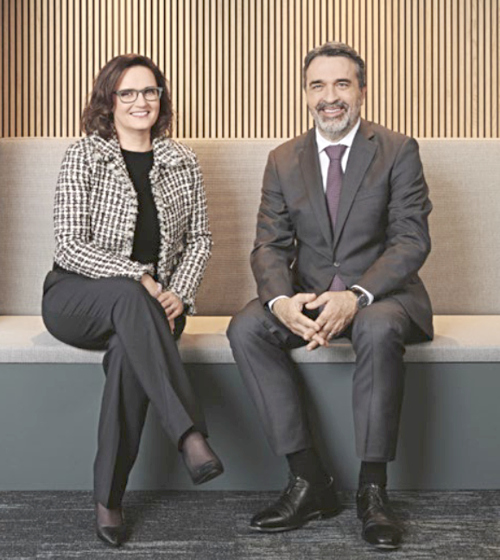The latest enforcement statistics from the supervisory authority are something to behold, and not just because of the bailout of Credit Suisse. Switzerland needs to think about how to put a stop to the misdeeds of its financial center.
«We wish you a stimulating read.» With those words, the chair of the Swiss Financial Market Supervisory Authority (Finma) Marlene Amstad, and director Urban Angehrn (pictured below) introduced the Swiss regulator's annual report for 2022 yesterday.
Stimulating is probably the wrong adjective to describe the contents of this accountability report. Terrifying would be more accurate.
Over 1,000 Active Cases
The statistics on enforcement are particularly eye-opening. This is the metric with which Finma measures its enforcement of applicable law. Enforcement procedures are among the toughest weapons the supervisory authority can deploy against rule violations.
Last year, the number of investigations carried out and proceedings concluded increased by over ten percent compared with the previous year, with completed enforcement actions surpassing the one-thousand mark in 2020. Two years later, Finma had to take action in 1,176 cases.
Insider Trading Clarifications
The trend is also up in other areas. Enforcement proceedings without administrative assistance have risen from 30 to 39 in the past three years in which 91 parties were affected, compared with 43 in 2020.
Investigations into insider trading climbed from 78 to 239 cases, while market manipulation cases increased from twelve to 22. The number of financial market participants operating without Finma licenses or other supervisory models rose from 191 to 206. And last year, the actions of 50 individuals were clarified, compared to just seven two years earlier.

(Image: Finma)
Rising Compliance Costs
The Swiss financial industry is increasingly becoming a venue for players who scoff at laws and regulations. It raises the question as to whether it's becoming a stage for outlaws. Given the increased investment in compliance over the years, especially in banking, this is hard to fathom. Costs are also rising at Finma, due in large part to its monitoring efforts. In 2022 alone, the authority spent 133 million Swiss francs, seven million more than the previous year.
More expensive monitoring and a denser network of requirements are not enough of a deterrent. The watchdog has to go on the prowl more often.
More Police?
To be sure, with more police officers, come more fines, and Finma has increased its staff in the past year. Upon request, the authority says it used enforcement in a targeted manner in recent years to enforce proper behavior.
More attention was being paid. According to a spokesman, enforcement is increasingly focused on the corporate governance of institutions and has consistently identified breaches of organizational regulations.
A Cry for Help
Nevertheless, the latest statements by Finma executives made in connection with the rescue of Credit Suisse could be interpreted as a call for enforcement help. Amstad called for her agency to be given authority to hand out fines and impose punitive measures on errant managers. Angehrn complained that currently the hurdles in punishing individuals are very high, and that supervision is limited in communicating cases.
Finma holds out the prospect of expanding reporting on enforcement proceedings, for example by publishing the details of selected orders. It remains to be seen whether this will put an end to the trend toward an increasing number of cases.
Very High Risks
It's disturbing the supervisory authority continues to grapple with the issue of money laundering that it has been warning about for years. In its risk monitor in November, the authority said there are continued very high risks in the area. The reports received by the Money Laundering Reporting Office Switzerland (MROS) and the corresponding calculations showed an increase of around 12 percent compared to 2020.
As Finma notes in its annual report, it closed another two procedures last year at a banking group and an insurance company, where the focus was on anti-money laundering and counter-terrorist financing requirements relating to a financial group.
Difficult to Understand
It's difficult to understand why there continues to be a Finma-approved mechanism allowing individuals to escape without sanction. Anyone who refrains from professional activity in the financial industry can hope the ongoing enforcement procedure will be dropped. The conviction of ex-Raiffeisen CEO Pierin Vincenz had already made use of this loophole in 2017, while two individuals involved in the Credit Suisse «Spygate» escaped proceedings last year.
If the supervisory objectives were already fully achieved with such a waiver, it could be appropriate to forego enforcement proceedings, Finma commented on the approach.
Reputation of Supervision
The supervisory authority caused a worldwide stir in the debacle surrounding the AT1 bonds of Credit Suisse when it allowed them to be completely written down. Switzerland should be concerned the reputation of its financial supervisory authority is not damaged as well over a flood of rules breaches. After all, in a delicate market phase, this could reflect on the supervised players in the Swiss financial center.
A fundamental decision is needed in favor of truly strong supervision, and the Finma chair's desired authority to impose fines is a step in the right direction. It is a blunt instrument that would provide Finma with a powerful means of consistently punishing violations of the rules.
A New Sheriff in Town?
As finews.com has analyzed, Finma is still too closely involved in federal politics, making it vulnerable to the actions of interest groups wanting to weak regulation for their business. The lesson to be drawn should be to disentangle politics and supervision, which is the best way to ensure the state can stay out of the next bank bailout.
Whether one wants to call in a new sheriff endowed with as much power as the US Securities and Exchange Commission is a matter for debate. But as the uproar over the postponed annual report at Credit Suisse showed, an authority set up in this way has at least one advantage. Worldwide respect.




































